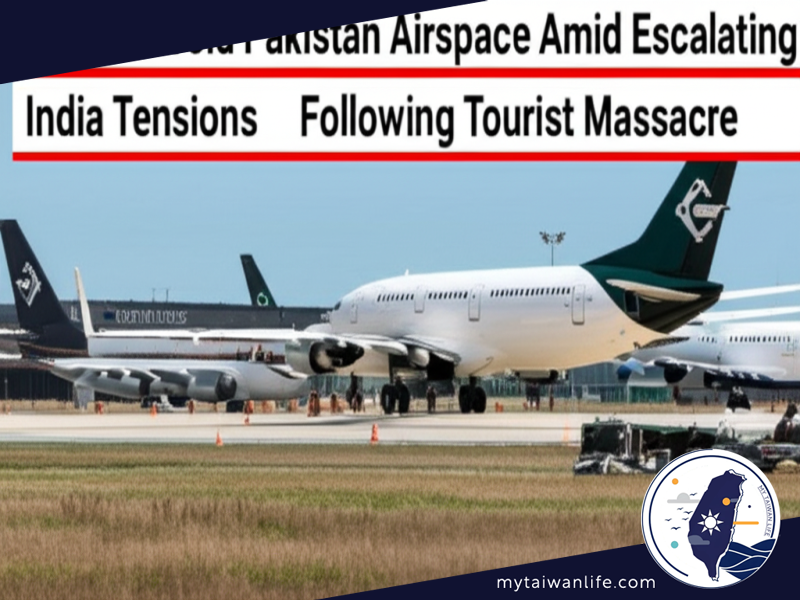Airlines Avoid Pakistan Airspace Amid Escalating India Tensions Following Tourist Massacre
Geopolitical tensions between India and Pakistan intensify, leading major airlines to reroute flights and disrupting global travel, as a tourist massacre fuels further conflict.

Multiple major airlines are rerouting flights, avoiding Pakistan's airspace due to heightened tensions with India following a recent tourist massacre. This latest geopolitical flashpoint is disrupting global travel, impacting airlines and potentially increasing costs for travelers.
Air France has suspended flying over Pakistan until further notice, citing the "recent evolution of tensions between India and Pakistan." The airline is adjusting flight schedules, and some routes will require longer flight times. Similarly, Lufthansa, the German flag carrier, is also avoiding Pakistani airspace.
The travel disruptions come after militants massacred 26 civilians, mostly tourists, in Pahalgam, Indian-administered Kashmir. India blamed Pakistan, which denied involvement, escalating tensions between the two neighbors. Both countries have closed their airspaces to each other’s aircraft. These increased tensions are now affecting international airlines, leading to higher fuel consumption due to longer routes.
Flight-tracking data indicates that British Airways, Swiss International Air Lines, and Emirates are rerouting over the Arabian Sea, turning north towards Delhi to avoid Pakistani airspace. Kashmir, a dangerous flashpoint, is controlled in part by India and Pakistan, who have fought three wars over the territory. The two nuclear-armed rivals are now flexing military muscle, increasing the risk of a dangerous escalation.
Pakistan conducted a second missile test in three days. India has also ordered mock security drills across its states. Despite these actions, the United States, China, and the United Nations Secretary-General, Antonio Guterres, have urged restraint. Guterres has appealed to both India and Pakistan to "avoid a military confrontation."
Water is a key issue in the ongoing tensions. India has suspended its involvement in the Indus Water Treaty, threatening a crucial agreement dating back to 1960. The treaty governs the sharing of water from the Indus River system, vital for Pakistan and northern India. Prime Minister Narendra Modi has stated India will prioritize its own water use. Indian media reported that New Delhi has cut water flow through the Baglihar dam, angering Pakistan. Pakistan has protested the construction of hydro projects India has started since suspending the treaty.
The military standoff could threaten Pakistan’s economy, already facing challenges. According to a report from Moody's, sustained escalation with India would likely weigh on Pakistan’s growth. A persistent increase in tensions could also impair Pakistan’s access to external financing. India, on the other hand, is not expected to see major disruptions to its economy due to its "minimal economic relations" with Pakistan, Moody’s added.
Cultural exchanges have also halted. India has blocked Pakistani celebrities' social media handles. The release of an Indian film featuring the Pakistani actor Fawad Khan is no longer expected. Khan's Bollywood comeback, anticipated by Indian critics and fans, has been impacted by rising tensions, recalling a de-facto ban on Pakistani talent imposed after a previous militant attack in Kashmir.
Other Versions
Las compañías aéreas evitan el espacio aéreo pakistaní en medio de la escalada de tensión con la India tras la masacre de un turista
Les compagnies aériennes évitent l'espace aérien pakistanais dans un contexte d'escalade des tensions avec l'Inde à la suite d'un massacre de touristes
Maskapai Penerbangan Menghindari Wilayah Udara Pakistan di Tengah Meningkatnya Ketegangan India Menyusul Pembantaian Turis
Le compagnie aeree evitano lo spazio aereo pakistano in un contesto di crescenti tensioni con l'India in seguito al massacro di un turista
観光客虐殺事件後、インドの緊張が高まる中、航空会社はパキスタン領空を避ける
관광객 학살 이후 인도 긴장이 고조되는 가운데 항공사, 파키스탄 영공 피하기
Iniiwasan ng mga Airline ang Kalawakan ng Pakistan sa Gitna ng Lumalalang Tensyon sa India Kasunod ng Pagpatay sa mga Turista
Авиакомпании избегают воздушного пространства Пакистана на фоне обострения напряженности в Индии после массового убийства туристов
สายการบินหลีกเลี่ยงน่านฟ้าปากีสถาน ท่ามกลางความตึงเครียดกับอินเดียที่ทวีความรุนแรงขึ้�
Các Hãng Hàng Không Tránh Không Phận Pakistan Giữa Tình Hình Căng Thẳng Gia Tăng Với Ấn Độ Sau Vụ Thảm Sát Du Khách

